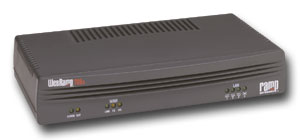Installation, Setup,
and Use
As with most networking products
the installation went very smoothly. Here's where a beginner needs a really
good manual. The manual included with the 700s is so well laid out that I
have to say it is the best networking related manual I've come across. They
even have screen shots of their utilities to walk you step by step through
the installation and configuration process. I've seen a few networking products
delivered with a manual smaller than the ledger for my checkbook. Ramp even
went to the trouble of including setup instructions and screenshots for many
of the optional configurations.
One interesting feature of the 700s
is its ability to be used to block certain web sites. Rather than blocking
by domain name the user goes to a tab in the software setup area and selects
general categories that can be blocked. A few of these are violence/profanity,
sexual acts, satanic/cult, and gambling/questionable/illegal. This is a very
handy feature for a small business trying to keep their workforce productive.
The administrator can even setup a block for active-x content, java, cookies,
or web proxies. I didn't go overboard with this feature, but needless to say
the ability to block certain sites is a useful feature for companies where
those sites can get employees into hot water. Remember the news of layoffs
at corporate levels from the viewing of certain sites? Or from the passing
of materials that were downloaded from those sites? A feature like this filter
can ensure that your employees can goof off all they want at E-bay and several
other non-work related sites without the specter of sexual harassment, racial
discrimination, or other suits or complaints having to enter the work environment.
For the average home user this feature isn't as necessary, but those of you
with small children can certainly appreciate how useful that feature could
become.
 Another
feature that is of note for businesses is the ability to automate reports
with this unit. The unit can automatically let you know when there have been
events such as unauthorized connection attempts, and access to blocked web,
FTP, and Gopher sites. You can also be notified if there have been blocked
ActiveX, cookies, proxy, and Java attempts. It will even notify you if there
have been attacks such as IP spoofing, Ping of Death, and SYN flood. With
such a long list of alerts you should be able to figure out where the attacks
to your network are coming from and have the peace of mind that the unit is
blocking them.
Another
feature that is of note for businesses is the ability to automate reports
with this unit. The unit can automatically let you know when there have been
events such as unauthorized connection attempts, and access to blocked web,
FTP, and Gopher sites. You can also be notified if there have been blocked
ActiveX, cookies, proxy, and Java attempts. It will even notify you if there
have been attacks such as IP spoofing, Ping of Death, and SYN flood. With
such a long list of alerts you should be able to figure out where the attacks
to your network are coming from and have the peace of mind that the unit is
blocking them.
There is one stumbling block for
this unit. The hub built into the unit is just that: a hub. I've gone into
deep detail before about hubs and switches in some of my other reviews. To
break it down simply a hub allows the data to move to every computer on the
network looking for the correct computer that the data should go to. With
a switch the data is automatically sent to the correct computer. While the
data reaches its destination in both situations, a hub produces a lot of unnecessary
congestion on the network and has a tendency for data to be lost due to lost
packets. For a small office or home setup a hub is perfectly fine for your
networking needs. Once more and more connections are added then a switch should
be introduced to keep congestion and lost packets to a minimum. I wouldn't
personally plan on building a huge network of computers behind a unit like
the 700s due to its lack of a switch and its 10 MBps speed. The 700s does
fill the needs of the average home user and small office quite well though.
